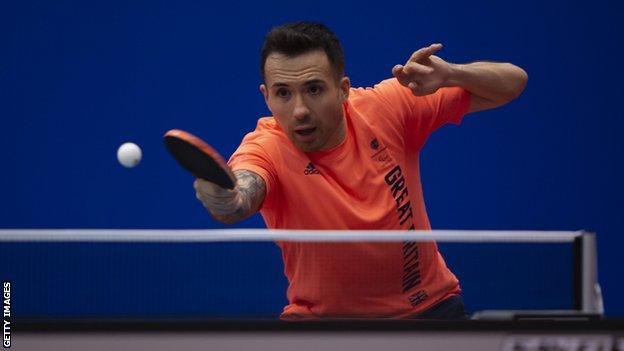Para-table tennis at Tokyo Paralympics: All you need to know
- Published

Will Bayley will be hoping to add to his Paralympic medal tally
Paralympic Games on the BBC |
|---|
Venue: Tokyo, Japan Dates: 24 August-5 September Time in Tokyo: BST +8 |
Coverage: Follow on Radio 5 Live and on the BBC Sport website |
Key information
Dates: 25 August-3 September
Venue: Tokyo Metropolitan Gymnasium
Gold medals on offer: 31
How does it work?
The sport follows the rules set by the International Table Tennis Federation with only slight modifications to the serving laws for athletes competing in wheelchairs. Each player aims to hit the ball over the net on to the opponent's half of the table and wins the point if they fail to return it successfully.
A match is played over the best of five sets, with each won by the first player to reach 11 points. If the score in a set reaches 10-10, though, a player must establish a two-point lead to win it. The server changes every two points.
Competitions take the form of preliminary rounds followed by knockout stages.
Team events will be played over the best of three matches - starting with a doubles contest and then up to two singles matches to decide the tie.
Athletes with a range of impairments can take part and there are 11 different classifications: 1-5 for those competing in wheelchairs, 6-10 for those who play standing and 11 for standing athletes with a learning disability.
Athletes are assessed and allocated a number between 1 and 10, depending on their functional ability - reach, muscle strength, locomotive restrictions, balance and ability to grip the bat. In the wheelchair category, those competing in class 1 have the highest level of impairment with class 6 being for standing athletes with the highest level of impairment.
Who are the British medal hopes?
Will Bayley (class 7) is bidding to defend his title - Bayley is back after suffering a serious knee injury during his time on Strictly Come Dancing and the year's delay may work in his favour. Ross Wilson (class 8) won team bronze last time and is the current individual world champion in his division. The men's class 6-7 and class 8 teams will also have high hopes. Rob Davies, the class 1 gold medallist in Rio, has been ruled out of Tokyo with a shoulder injury.
Who are the other challengers?
China topped the medal table at the Rio Games and will be strong again. Among them is Panfeng Feng (men's class 3) who will be aiming for a fourth singles title in a row. South Korea was the leading nation at the 2018 Worlds while Poland, Turkey and France are also strong. Poland's Natalia Partyka competed at both the Olympic and Paralympic Games in 2008, 2012, 2016 and is doing the same this year too.
Did you know?
Table tennis was part of the Paralympic movement before it was played at the Olympics. It was one of the sports included in the first Paralympic Games in Rome in 1960 but it was the Seoul Games in 1988 when it made its Olympic debut.
ParalympicsGB Rio 2016 medals
Three - two individual golds (Will Bayley and Rob Davies), one team bronze (Bayley, Aaron McKibbin and Ross Wilson).